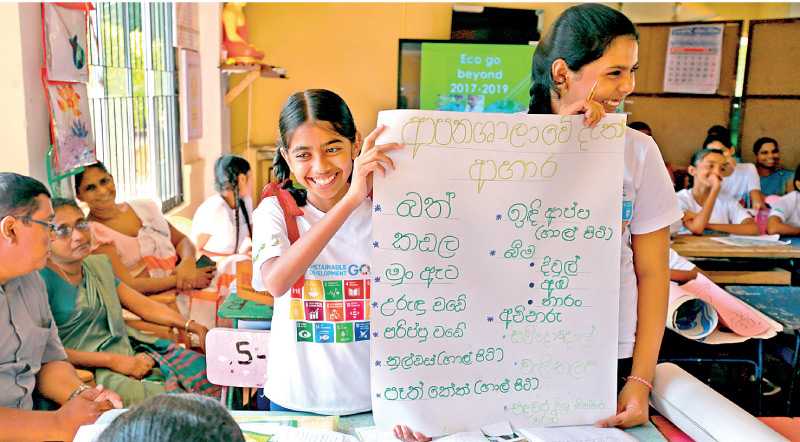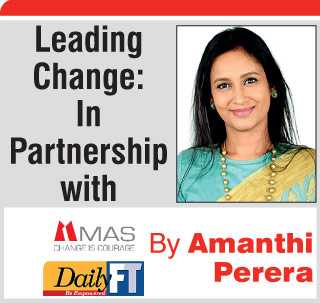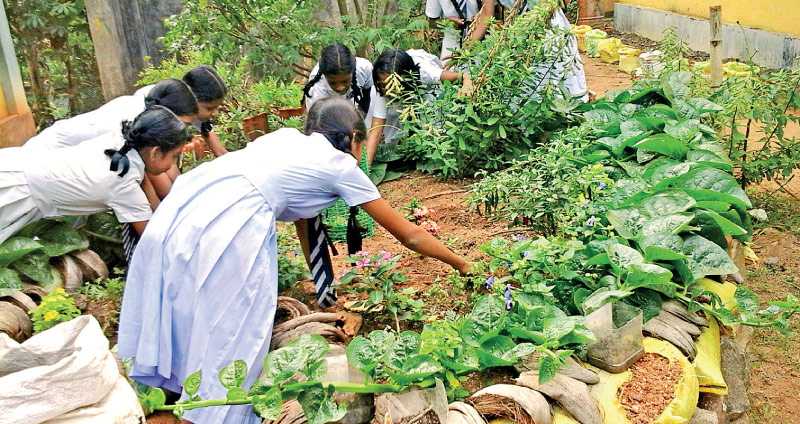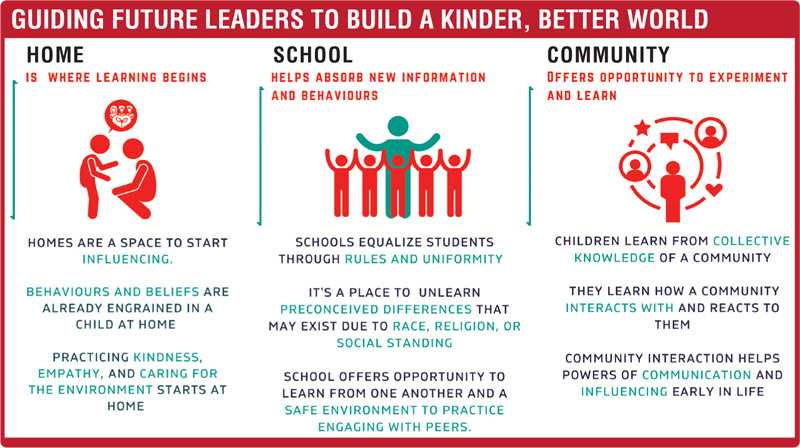Tuesday Feb 17, 2026
Tuesday Feb 17, 2026
Wednesday, 10 February 2021 00:19 - - {{hitsCtrl.values.hits}}

The ‘Eco Go Beyond’ sustainable schools program is a holistic model encompassing social, environmental, and economic development, set up in 2006 in response to the need to invest in sustainable development education as a longer-term intervention in creating change within our communities. The intent of the program is to inspire the next generation of leaders, embedding them with sustainability thinking from a young age
 With the world experiencing an unprecedented trajectory of social, environmental and economic change in 2020, the COVID-19 pandemic saw hundreds of millions of students around the world impacted by full or partial school closures.
With the world experiencing an unprecedented trajectory of social, environmental and economic change in 2020, the COVID-19 pandemic saw hundreds of millions of students around the world impacted by full or partial school closures.
UNESCO estimates that at least 320 million children globally did not have access to classrooms as at 1 December 2020. While news of vaccines is welcome and offer glimmers of hope around the world, the reality remains that getting children back to classrooms and to normalcy will take longer than the next few months.
Even then, there is much that we need to consider about how we want our next generation to learn from the pandemic. The world as we know it has changed drastically, and now more than ever, it is crucial that children learn how to create a more sustainable and resilient world for their future.
The need for sustainable development education
While sustainability has been a topic of significance since the 1980s, the introduction of the Millennium Development Goals (MDGs) signalled the mainstreaming of the sustainable development agenda. Events such as the release of Al Gore’s film ‘The Inconvenient Truth’ brought issues like climate change to forefront of our collective psyche.
With this came the public awakening that we have been taking too much from the planet; and the risks that the human race faced as a result of our own actions became visible and tangible. With this moral awakening, people realised that a holistic approach to sustainability was essential to our survival.
However, the changes in behaviour required to move the needle has not matched the pace of the problem. Even as adults armed with a wealth of knowledge and information, we find it difficult to adapt our behaviours and embrace the mindset shift that is required to drive change. This mindset does not come to many of us naturally as we have not been taught to think this way. The need to change behaviour at a mass scale caused a shift in focus towards sustainability education as a key enabler in achieving a more sustainable future for us all.
UNESCO recognised the need to formalise sustainability education and introduced the UN Decade of Education for Sustainable Development from 2005 to 2014. Their goal was to mobilise the world into using education to create a more sustainable future by integrating the principles and practices of sustainability into the expanse of learning. The aim was clear. To inspire the next generation to embed sustainable development into every decision they make, by balancing environmental integrity and economic viability with a just society.
At the same time, many businesses were also starting to look at their operations more carefully, considering their use of resources, and making changes to mitigate their impact on the planet. But to be a sustainable business, the ecosystem also needed to be sustainable. Sustainability cut across physical boundaries, and businesses needed to ensure that their communities developed along with them. While we had already been engaged in strengthening our communities for several years at MAS, we recognised the need to invest in sustainable development education as a longer-term intervention in creating change. Our sustainable schools programme, ‘Eco Go Beyond’ is a holistic model encompassing social, environmental and economic development, set up in 2006 in response to this need. The intent of the programme was to inspire the next generation of leaders, embedding them with sustainability thinking from a young age.
Schools were the catalysts in driving this change; as a space for learning with allocated time, resources, and educators, they proved to be the most effective places to influence a captive audience. Therefore, engaging schoolchildren on sustainability education was a natural fit, strengthened by the Sri Lankan culture of prioritising the betterment of children. In order to reach schools across the country, including our own communities, we partnered with the Ministry of Education, ensuring that we were aligned with our most critical and likeminded stakeholder.
Formalising sustainable development curricula
In Sri Lanka, our historical practices are steeped in sustainable behaviour. From the way we cultivated our agricultural lands, to the natural, organic methods of farming, to the plant-based food we have eaten, Sri Lankan history is full of examples of practices that have been good for our people and good for our planet. In building the sustainable development curriculum for our own Eco Go Beyond programme, the team at MAS found that it was useful not just to learn from the global best practices, but also to inculcate these ancient local teachings into the content.
With students already learning these in school through subjects such as social studies and environment, the connections between the content made for more relatable learning. History and religion too provides us a wealth of information to tap into, with examples like King Parakramabahu’s famous adage of “let not even one drop of water that falls on the earth in the form of rain, be allowed to reach the sea without being first made useful to man” and the teachings such as the sacred Middle Path in Buddhism, which lend well to the idea of minimising consumption, and practicing love and kindness to all beings.
Working in collaboration with experts, educators and policy makers can afford the right mix of expertise, experience and policy in formalising curricula that works for our local schools. The combination of Sri Lankan experts who can crystallise local insights into relevant content extracted from global best practices provides the best of both worlds for the students. While educators and experts can bring in the know-how, government has a critical role in influencing change and adoption at a national scale by incorporating sustainable practices into schools through policy and regulation. Such a curriculum must always be evolving and responsive to the changes that are happening in the world. A holistic approach encompassing social, environmental and economic subject matter must also take on a mid- to long-term view, allowing for enough time in a cycle of learning for students to absorb the learning and then activate within their schools, homes and communities. The Eco Go Beyond model follows this line of thinking with comprehensive three-year cycles of learning, sensitisation, activation, in alignment with the UN Sustainable Development Goals.
The triumvirate: Home-School-Community
While schools may be the obvious option for driving sustainability education, a child’s home, school, and community play equally significant roles in influencing behaviour change through learning. A young child’s learning begins at home, from the moment she is brought into the world. By the time a child starts her formal education, certain behaviours and beliefs are already engrained within her. Therefore, the home and parents and caregivers, have a critical role to play in influencing young minds towards practicing kindness, empathy, and caring for their community and environment.
The structure of the school systems and the fact that formal education in Sri Lanka is regulated through policy provides an opportune learning culture. The school environment, which children go to with the specific intent of learning, is a conducive space to absorb new information and adopt new behaviours. The processes in school equalise students through rules and uniformity, and alleviate preconceived differences that may exist due to race, religion, or social standing, which allows for greater opportunity to learn from one another.
The community allows young people the opportunity to experiment and learn, not only through the collective knowledge of a community, but also through how a community interacts with and reacts to them. Interactions that extend beyond the school and home provide students the opportunity to learn about their powers of communication and influencing early in life.
The combination of these places of educational influence can also support children who learn at different paces and styles and respond to different methods of learning. Children also begin to respect that learning can come from anyone, be it a teacher, a parent or adult, or even their peers or juniors. These interactions inculcate confidence in children, who then recognise their self-worth and are unafraid to speak up—factors that greatly influence their safety and security, and support their self-actualisation.
Change challenges and opportunities
The journey of driving sustainability education is unlikely to be linear and is full of opportunities and challenges. As in most such efforts, collaboration is critical. In our journey of over fourteen years, we have built long-term relationships, aligning intent and convincing likeminded partners of the importance of continuity and longevity. We have challenged some traditional notions of formal education, acknowledging that not all subject matter can be taught in the same way, and more importantly that not all children will learn in the same way or at the same pace. The journey has also led us to consider social, cultural, and gender biases that might exist, and ensure that diversity, acceptance, and inclusion are encouraged. A few years into our Eco Go Beyond curriculum, we had the opportunity to incorporate ‘multiculturalism’ as a focus area during the post-war period when there was increased attention on reconciliation.
As businesses, we have the privilege of adopting change quickly. With access to world-leading technology, knowledge and experts, and state-of-the-art systems and efficiencies, business has the unique opportunity to fast track change. In fact, this is an opportunity that we were able to capitalise on during the pandemic, when school closures prevented us from carrying out the program physically in schools. We were able to collaborate with some of the schools to move learning onto virtual platforms, and last year initiated the first phase of a digital rollout, where we are learning and adapting from the pilot. There is great potential that a successful transition to virtual learning could provide us the opportunity to broaden our reach to many more schools within and beyond Sri Lanka. We have also formulated a student-led model of the programme for 2021, giving greater flexibility for projects to continue even through periods of lockdown and school closures.
Over the past 14 years, we have experienced that our interventions in sustainable development education have not only influenced students, but also teachers, principals, parents, extended families and communities. The greatest impact occurs when students and educators experience the benefits of sustainability education first-hand. This leads to a sense of ownership that is an incomparable motivator.
Principals and teachers see how self-discipline and order can improve the performance of both the students and the school. The students realise their own potential and are given the agency to embrace their role in driving change. Teachers who have moved to different schools even replicate the model in their new schools. Sustainable development practices sustain within the school system, ensuring that even newer students who have not undergone the programme directly, can benefit from the principles of sustainability that have been left behind.
This, is the true power of sustainable development education. Students may grow up leave school, attend universities, start careers and families, all the while carrying the ripple effects of education to their new environments and begin to create their own spheres of positive influence; thus developing and inspiring a network of future sustainability leaders for their communities, for our nation, and for the world.

The Eco Go Beyond sustainable schools program is based on a three-pronged approach of activation, recognition and reward, and sensitisation. Through this program, students are encouraged to take a hands-on approach to put their learnings into action, including growing their own organic gardens within the school, managing waste, measuring and reducing resource consumption such as water and electricity, while also encouraging multiculturalism, community engagement and knowledge sharing

(The author is currently the Deputy General Manager – Strategic Sustainability at MAS Holdings and heads the social sustainability pillar for the group. Her background in the environmental sciences and her lifelong belief in the power of education in creating positive change blended perfectly when she was asked to provide leadership to the Eco Go Beyond Programme early in her career at MAS. She completed her Masters in Environmental Sciences from Jawaharlal Nehru University, New Delhi in 2007 and has worked in the area of sustainability since 1999 in roles spanning across NGOs, the government and the private sector.)